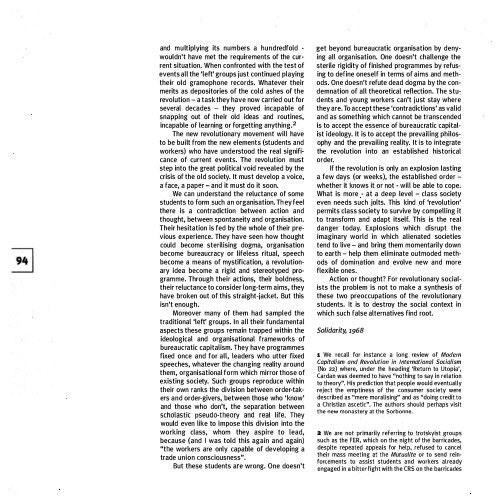SITUATIONISTS AND THE 1£CH MAY 1968
umMYFs
umMYFs
Create successful ePaper yourself
Turn your PDF publications into a flip-book with our unique Google optimized e-Paper software.
and multiplying its numbers a hundredfold -<br />
wouldn't have met the requirements of the current<br />
situation. When confronted with the test of<br />
events all the 'left' groups just continued playing<br />
their old gramophone records. Whatever their<br />
merits as depositories of the cold ashes of the<br />
revolution -a task they have now carried out for<br />
several decades - they proved incapable of<br />
snapping out of their old ideas and routines,<br />
incapable of learning or forgetting anything. 2<br />
The new revolutionary movement will have<br />
to be built from the new elements (students and<br />
workers) who have understood the real significance<br />
of current events. The revolution must<br />
step into the great political void revealed by the<br />
crisis of the old society. lt must develop a voice,<br />
a face, a paper - and it must do it soon.<br />
We can understand the reluctance of some<br />
students to form such an organisation. They feel<br />
there is a contradiction between action and<br />
thought, between spontaneity and organisation.<br />
Their hesitation is fed by the whole of their previous<br />
experience. They have seen how thought<br />
could become sterilising dogma, organisation<br />
become bureaucracy or lifeless ritual, speech<br />
become a means of mystification, a revolutionary<br />
idea become a rigid and stereotyped programme.<br />
Through their actions, their boldness,<br />
their reluctance to consider long-term aims, they<br />
have broken out of this straight-jacket. But this<br />
isn't enough.<br />
Moreover many of them had sampled the<br />
traditional 'left' groups. In all their fundamental<br />
aspects these groups remain trapped within the<br />
ideological and organisational frameworks of<br />
bureaucratic capitalism. They have programmes<br />
fixed once and for all, leaders who utter fixed<br />
speeches, whatever the changing reality around<br />
them, organisational form which mirror those of<br />
existing society. Such groups reproduce within<br />
their own ranks the division between order-takers<br />
and order-givers, between those who 'know'<br />
and those who don't, the separation between<br />
scholastic pseudo-theory and real life. They<br />
would even like to impose this division into the<br />
working class, whom they aspire to lead,<br />
because (and I was told this again and again)<br />
"the workers are only capable of developing a<br />
trade union consciousness".<br />
But these students are wrong. One doesn't<br />
get beyond bureaucratic organisation by denying<br />
all organisation. One doesn't challenge the<br />
sterile rigidity of finished programmes by refusing<br />
to define oneself in terms of aims and methods.<br />
One doesn't refute dead dogma by the condemnation<br />
of all theoretical reflection. The stu<br />
dents and young workers can't just stay where<br />
they are. To accept these 'contradictions' as valid<br />
and as something which cannot be transcended<br />
is to accept the essence of bureaucratic capitalist<br />
ideology. lt is to accept the prevailing philosophy<br />
and the prevailing reality. ltis to integrate<br />
the revolution into an established historical<br />
order.<br />
If the revolution is only an explosion lasting<br />
a few days (or weeks), the established order -<br />
whether it knows it or not - will be able to cope.<br />
What is more - at a deep level - class society<br />
even needs such jolts. This kind of 'revolution'<br />
permits class society to survive by compelling it<br />
to transform and adapt itself. This is the real<br />
danger today. Explosions which disrupt the<br />
imaginary world in which alienated societies<br />
tend to live - and bring them momentarily down<br />
to earth - help them eliminate outmoded methods<br />
of domin,ation and evolve new and more<br />
flexible ones.<br />
Action or thought? For revolutionary socialists<br />
the problem is not to make a synthesis of<br />
these two preoccupations of the revolutionary<br />
students. lt is to destroy the social context in<br />
which such false alternatives find root.<br />
Solidarity, <strong>1968</strong><br />
1 We recall for instance a long review of Modern<br />
Capitalism and Revolution in International Socialism<br />
(No 22) where, under the heading 'Return to Utopia',<br />
Card an was deemed to have "nothing to say in relation<br />
to theory". His prediction that people would eventually<br />
reject the emptiness of the consumer society were<br />
described as "mere moralising" and as "doing creditto<br />
a Christian ascetic". The authors should perhaps visit<br />
the new monastery at the Sorbonne.<br />
2 We are not primarily referring to trotskyist groups<br />
such as the FER, which on the night of the barricades,<br />
despite repeated appeals for help, refused to cancel<br />
their mass meeting at the Mutualite or to send reinforcements<br />
to assist students and workers already<br />
engaged in a bitter fight with the CRS on the barricades










